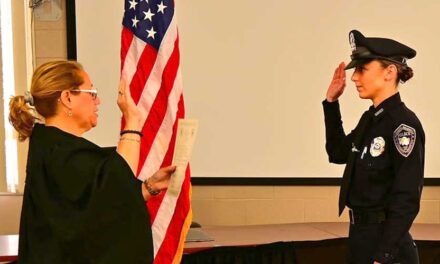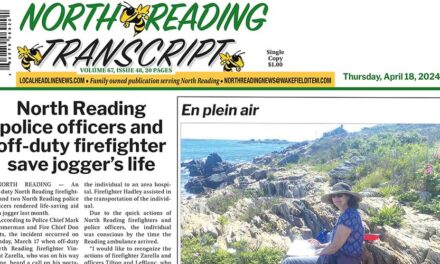Published in the July 19, 2018 edition
By JILLIAN STRING
NORTH READING — Hood School Principal Glen McKay and Batchelder School Principal Sean Killeen presented the improvements plans for all three elementary schools at the June 11 School Committee meeting. Little School Principal Chris Molle was unable to attend the presentation.
Each plan presented entailed specific goals accomplished at each school during the 2017-2018 school year, as well as goals and objectives for the 2018-2019 school year.
Highlights at the Hood School included the implementation of makerspace days, a revamped Fine Arts Night, the introduction of a school wide community meeting, the Parents Association auction fundraiser, and the refining of the co-teaching model.
McKay introduced the 2018-2019 goals of teaching and learning, management and operations, family and community engagement, and professional culture.
“Our focus (for teaching and learning) is to implement best practices to meet the needs of all learners,” McKay said. “This year, we’ll focus on differentiated instruction across settings. We have some opportunities to improve that practice across all classrooms rather than just the co-taught classrooms.
McKay noted that the management and operations goal will be to provide a safe learning environment for students. The Hood School will be evaluating its dismissal procedures, and will also be implementing a “caught being good” initiative, where students can be recognized for good deeds. Social-emotional learning (SEL) will also be tied to this goal area.
According to McKay, the objectives of the family and community engagement goal will be to promote the learning and growth of all students and successes of all staff through community partnerships with parents, School Committee, town organizations, and all stakeholders within the school community.
“Educating children is a community effort involving parents, as well as community resources and provides continual reinforcement of the academic and social ideas embraced by the school and community,” McKay stated.
The professional culture goal will focus on working together as a learning community.
“Our professional school culture demonstrates a commitment to high standards that foster high performance and demonstrates student learning,” McKay said.
At the Hood School, the teachers formed study groups to research and report on various school activities including the makerspace, co-teaching, and school climate.
Little School updates
McKay stated that the 2017-2018 highlights for the Little School included the WIN block makerspace event designed by staff and parents, increased technology opportunities in the classroom, development of new school rules, expanded data days, and the continued encouragement for staff to participate in sheltered english immersion (SEI) endorsement programs.
According to McKay, Molle’s focus areas for teaching and learning include continuing efforts on the improvements of the high needs subgroup, response to intervention (RTI) practices, Title I math instruction, co-teaching opportunities, and revisiting inclusion versus pull-out services.
“Under management and operations, the Little School will be exploring social-emotional learning, positive behavioral intervention and supports, as well as mindfulness,” McKay noted.
Killeen added that family and community engagement at the Little School will continue to focus on parent involvement in committees at the school, as well as the school council, curriculum nights, and speaker series.
Utilizing the results of the staff survey, Killeen reported that the school will continue to improve professional culture with team building activities, community service initiatives, peer observations, and book studies.
Batchelder information
Highlights for 2017-2018 at the Batchelder School included much work with science standards, launching of the makerspace, vertical alignment with Eureka math, continued professional development (PD) for school safety, and community meetings.
For the teaching and learning goal, Killeen noted that Empowering Writers will be used as PD for staff, and co-teaching will continue to be implemented as appropriate.
“Management and operations, it’s that safe learning environment for all. We will continue to look at our survey data from students and families to make sure that they’re prepared to take risks in the classroom, provide enrichment and educational opportunities to address documented areas of need,” Killeen said.
He added that (SEL) will be a large focus at the Batchelder School as well.
Killeen expressed gratitude for the community involvement at the school, and hopes to expand this involvement through the family and community engagement goal.
“North Reading is generous in so many ways, financially, the support we get from our parent organizations, the auctioneers. One thing we’re really looking at is the investment of time, and looking at different ways we can bring volunteers into the school,” Killeen stated.
According to Killeen, the school has been focusing on streamlining staff evaluation goals to include professional culture and how it impacts student learning.
Both principals thanked the school councils for all of their hard work this year.
School Committee response
Committee Chairman Janene Imbriano inquired about the student recognition programs being used at the schools, wanting to make sure they were all similar.
Both Killeen and McKay noted that the programs are similar and bring a heightened awareness of school values to the students.
Vice Chairman Scott Buckley stated he liked how the schools pushed each other, yet maintained their own identities. He also expressed some concern over potential funding inequities.
“I’m always concerned about our budget, whether or not we can support it. I hate if we push onto the PTO things that the school budget should be funding…with different schools sometimes there’s an inequality in the funding…If there is a funding difference, or if it’s ever impacting education, (it should be) brought up so we can address things,” Buckley said.




